When you are at the crossroads of choosing the best IELTS preparation strategies, some first-class advice might be very beneficial.
Well, you are at the right place. We’ve collected some fundamental IELTS preparation tips and resources. Find out how long does it take to prepare for IELTS and what are the best preparation books in our article.
IELTS tips and tricks for each section included!
Ready to start?
🥇 IELTS Preparation Tips. The Success Mindset
Practicing grammar and expanding vocabulary is good, but it’s worthless without careful planning and a rational mindset.
You will just waste your time and effort if the process is chaotic.
It refers to any job you want to do well, and IELTS is not an exception. Your attitude towards the exam makes fifty percent of the progress. Working hard and wisely to make it more efficient and score the highest.
So, what makes a good mindset for preparation?
- See it as a challenge, not as a threat. It is not a test that is going to define your whole life. You can retake or try other options.
- Don’t compare yourself with others. Maybe some of your classmates or friends are a lot better or worse than you in English. Think about your own goals and your own pace.
- Forget about quick results. IELTS is not something you can prepare for overnight. One week is not enough either. A month is fine if your current level is close to your goal. Think of it as the minimum period required for thorough preparation.
- Try to learn English, not just for IELTS. You can do it for yourself, for fun, and for future opportunities. English knowledge can become an excellent assistant in many situations.
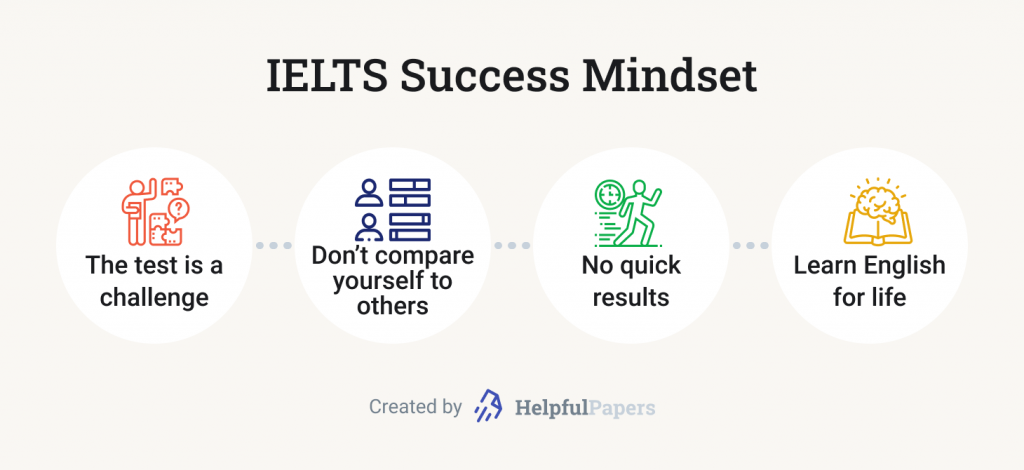
How not to Over-Prepare for IELTS
Some students think that only studying is the key. The more you learn, the better you understand the topic. Well, it is not the best idea. Over-time studies make you slower and less attentive and your brain overloaded.
How to avoid overpreparation?
- Start in advance. Estimate the time you need and spread your tasks within this period.
- Follow your studying plan. You have to make it first, and once you have done it, stick to the chosen course.
- Switch your focus. When you feel it is enough reading for today, go for listening or other exercises.
- Keep work-life balance. Don’t devote 100% of your time to the preparation; it’s not the whole life.
⏳ How Long Does It Take to Prepare for IELTS?
There is no exact answer.
One month is an essential minimum for every person, but there are many factors to consider.
You need to a) define the goal and assess how far you are from it; b) think about how much time on average is required to boost your English to the level you need; c) evaluate how much time you can devote to studying per day or week; d) find out your strong and weak sides.
The main factor is the frequency and efficiency of the lessons, not the length of the whole process.
How to Study IELTS by Myself? A 4-Step Guide for 2025
These days you can study anything on the Internet. You can have a flexible timetable, and online studies are cheaper or free at all. You just need to find authoritative sources, relevant information and plan your time reasonably while studying at home.
IELTS Step-by-Step #1: Find the Resources
(Un)Fortunately, the Internet offers lots of information, from PDF books to online courses and apps. For efficient IELTS preparation, you should decide on a couple of the sources that are the most reliable and suitable for you.
⚠️ Don’t try to go through everything available; it is a bad idea. Most of the resources have almost similar advice and tasks, so you will just waste time.
Here are the services offering the best IELTS preparation tips and materials for self-preparation:
IELTS Step-by-Step #2: What Are Your Weak Points?
Analyze yourself. It is vital when it comes to preparation. You need to devote most of your time to your weak points. The strong ones just need some polishing.
Take a practice test and find out your soft spots.
For instance, some people find it harder to understand native speakers, and others are troubled with the reading section. However, it is not only about the language skills needed for IELTS. There also can be issues with time management, active vocabulary, or grammar.
Until you at least figure them out, you’ll be stuck in one place.
IELTS Step-by-Step #3: Know the Details
You need to know the structure and the timing of the exam, the types of questions and tasks you might have. You also should be familiar with the registration process and rules during the test. This will help you to save some time and lots of nerves.
IELTS Step-by-Step #4: Practice Regularly
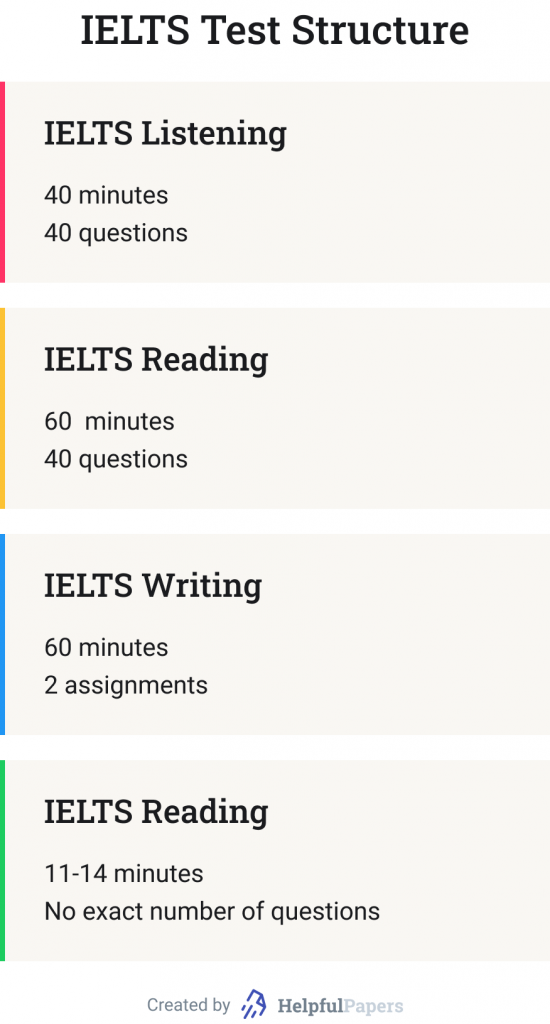
Practice makes perfect.
Regularity is the key to your preparation. Try to learn at least ten words every day. A vast active vocabulary helps in every skill you need.
It doesn’t mean you have to study new grammar or do mock tests every single day. (This is what you need a reasonable schedule for.)
Just try to integrate English into your routine: podcasts, movies, series, or books, everything that seems interesting to you, should be in English. After consuming information, analyze everything you read or listened to. Focus on the new words and expressions, pronunciation, and the way the speakers structure their thoughts.
Then implement the new knowledge in your studying process.
Now.
Let’s get to each IELTS section separately.
🎧 Tips for IELTS Listening
For many test-takers IELTS listening section seems to be the easiest. The trick is that it is not only about understanding the recording.
Remember that you will need to write the answers too.
- There are four recordings in the listening part.
- Thirty minutes to listen and ten to transfer your answers.
- Each audio can be of different duration and with a different number of questions.
- Usually, there are both monologues and group conversations.
Below, we will give some guidelines on managing the time and effort wisely and share some life hacks.
IELTS Preparation Tips [Listening Format]
Follow these simple techniques to have better results instantly:
Listening. IELTS Tips and Tricks
Listening practice without a purpose is not that fruitful for your preparation. You can get better at some test skills, but you still spend most of the time just entertaining yourself. Here are the specific things you need to train when you prepare for the IELTS listening part:
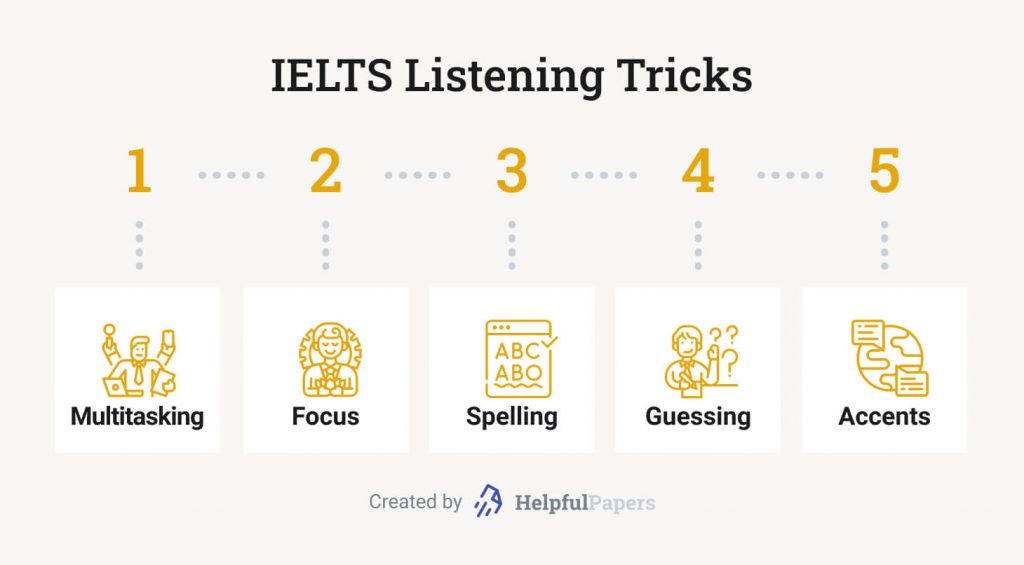
- Multitasking. It seems challenging to listen and write simultaneously, but you will see the improvement very soon.
- Concentration. You will listen to each audio once, which means you need to know how to focus. Make sure you listen till the end. Sometimes the speakers change their minds or add new essential information.
- Spelling. Even if you heard and understood the word, wrong spelling means you lose your point. Check out how to write the words that you learn.
- Guessing. An intelligent assumption might save you some points if you missed the information while listening.
- Perception of different accents. Change the accents you listen to from time to time. You can watch YouTube channels and movies of different origins to train your ears
We have prepared a list of valuable resources that will help you to succeed in the listening part:
Free IELTS Listening – practice sample questions | IDP IELTS
IELTS practice test | IELTS.org
Complete Guide to IELTS Listening – Magoosh Blog — IELTS® Exam
IELTS Listening test – Free practice
IELTS Listening Question Types | Study.com
Listening practice tests | Take IELTS
📖 Tips for IELTS Reading
If you think that the IELTS reading section is exhausting, you are not the only one. That is why it is essential to spend less time but with a more conscious approach.
What do you need to know about reading before we start?
- It lasts one hour.
- You will have three texts to read and forty questions to answer.
- The texts are usually about complex issues from different disciplines.
We will show you how to manage your time and give some useful tips for IELTS reading below.
IELTS Preparation Tips [Reading Format]
The primary purpose of the task is to understand what the text is about, not every word. It tests your ability to find and analyze the given information. Give yourself twenty minutes for each text.
You need to know how to use these two techniques to save your time on the exam:
Reading. IELTS Tips and Tricks
Here’s what we suggest to lean on when practicing IELTS reading.
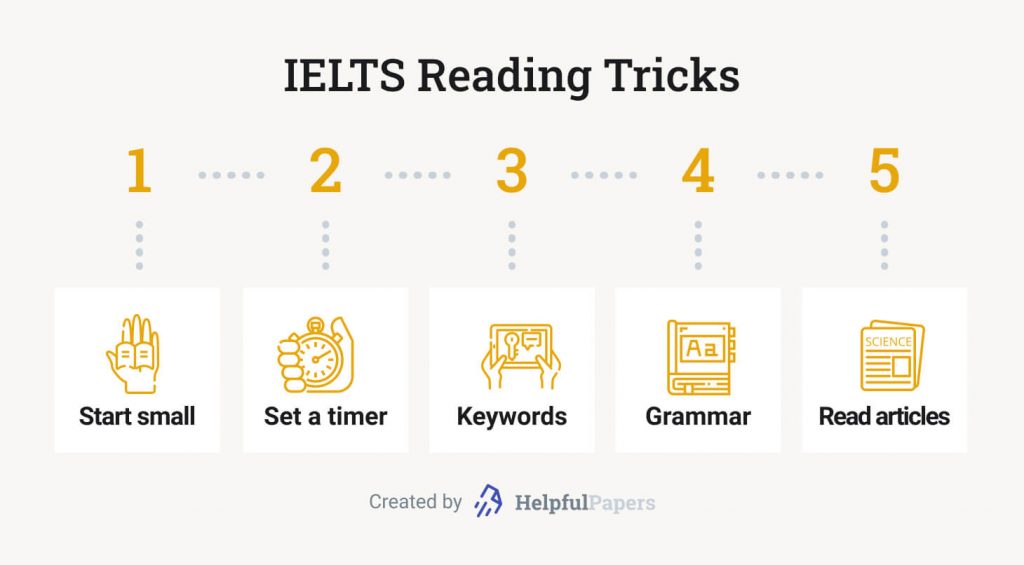
- Encourage yourself. If you don’t like reading in general, start with something really catchy: short articles and stories, blogs, and small books. Once you have developed a habit, try to read something more sophisticated.
- Use a timer or a stopwatch. Works well when you work with practice tests and reading as well. You can use it for two purposes: evaluating your average reading speed and setting a deadline. Try to estimate how fast you need to read to do the tasks in time.
- Distinguish keywords. First, underline them in the texts. After some practice, you will be able to see them on the spot.
- Work on grammar and vocabulary. They are both important when you complete the answer sheet. Pay attention to suffixes and prefixes that you use to change one part of speech to another.
- Read different articles. You can get a text on any topic on the exam. That is why it is essential to read everything from biology to ancient art.
Check out additional sources with fantastic tips for IELTS reading:
5 Top Tips for Scoring High on the IELTS Reading Section
The Complete Guide to IELTS Reading – Magoosh Blog — IELTS® Exam
IELTS Academic Reading – free preparation materials | IDP IELTS
IELTS Reading Practice: Practice at Home for Free; IELTS Advantage
✒️ Tips for IELTS Writing
Writing is one of the most challenging parts for many of us. But don’t get confused! Regular practice will help anyone to manage this task.
- There are two parts in the writing section.
- You have one hour to complete the task.
- The first part should be at least 150 words on a general topic (and chart or diagram description in Academic Writing).
- The second part is at least 250 words on a general topic.
Our IELTS writing tips below will help you to accept and win this challenge.
IELTS Preparation Tips [Writing Format]
There are several things you need to remember to succeed in the IELTS writing section.
You should spend about twenty minutes on Task 1and forty minutes on Task 2. At the end of the task, check your structure, paragraphing, spelling, and grammar.
Writing. IELTS Tips and Tricks
Here are the main things you have to work on to get a perfect score on your IELTS exam.
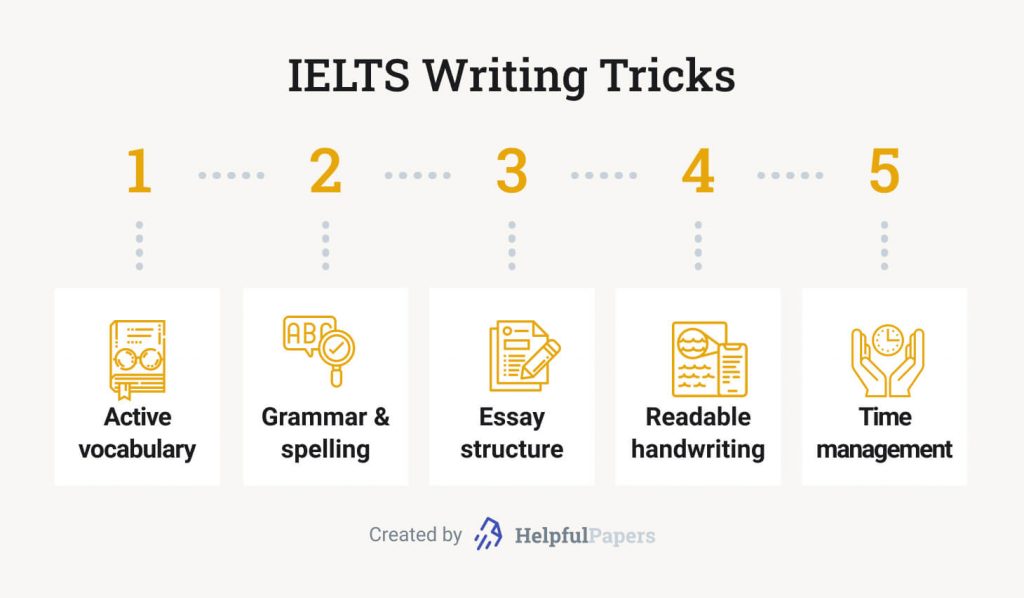
- Active vocabulary. Only the words you understand are not enough; also, work on the words you use and know when to use them. Practice using synonyms instead of repeating something several times. Academic writing requires some specific vocabulary that people do not typically operate in daily life. Make sure you have learned it.
- Grammar and spelling. These are the key factors that define your literacy. You need to be able to use various sophisticated grammar and vocabulary accurately.
- Essay structure. Learn about the types of essays that are used in IELTS. Each one has a different structure. Read some samples and try to write your essays according to the examples. Aim to make it an automatic process.
- Bad calligraphy can become a problem. Your rater can misunderstand what you were trying to say and just lower your score. When you write, check if your paper is readable.
- Time management. Again, use a timer and make test simulations from time to time. See if you have enough time to complete the task. If not, try to minimize it each time.
Need more information on how to get an excellent result in IELTS writing?
IELTS Online Practice Materials
IELTS Academic Writing, Free Test Preparation Exercises & Materials
IELTS Writing Task 1: Everything You Need to Know
IELTS Writing Task 2: Everything You Need to Know
💬 Tips for IELTS Speaking
This part is not just about talking.
- The speaking part lasts not more than 15 minutes and consists of 3 parts.
- In the first part, an examinator asks you simple questions about your life in general.
- In the second part, you will have to deliver a short two-minute speech and then answer some additional questions if needed. There is one minute to prepare.
- In the third part, they will ask you more abstract questions where you will have to state and explain your opinion.
Find a speaking partner or prepare alone; you can also combine both methods.
Don’t know where to start? We wrote down a couple of useful tips for you.
IELTS Preparation Tips [Speaking Format]
What do raters want to hear?
A well-structured speech of appropriate length. Correct pronunciation and a variety of grammar and vocabulary are more critical than your accent.
Speaking. IELTS Tips and Tricks
These are the areas of improvement which are the most essential for achieving a high score:
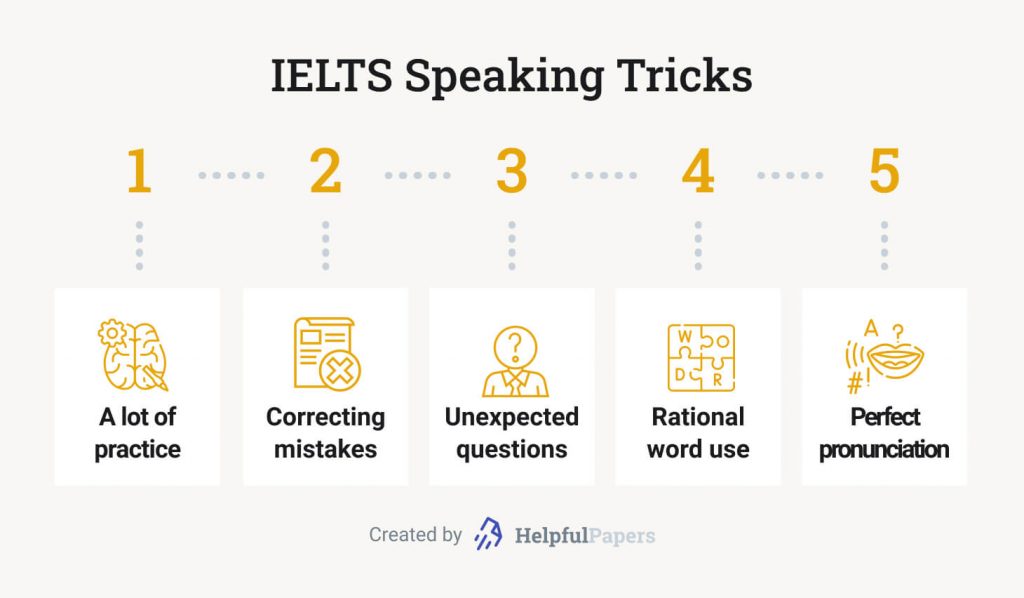
- Practice. You can find typical IELTS Speaking questions online and answer them. Don’t worry if there is no one to talk to. You can always record your answers and analyze the recording.
- Correct your mistakes. If you have already made a slip, you can’t take it back. It is better to show that you actually know how to say it correctly, rather than ignoring it completely.
- Prepare for unexpected questions. If you search for IELTS questions online, you will find out that some of them are odd. They are not routine questions that you are used to answering. e.g., “What is your favorite furniture?”. Train your responses.
- Use sophisticated vocabulary appropriately. It is good that you learned a lot of words. But some of them can sound like bragging, some of them are too formal. Use them freely if you are sure they fit the context.
- Pronunciation over accent. This is a massive bonus if you sound like a native speaker. But before honing your accent, pay more attention to the correct pronunciation. Raters are going to value it more.
And here are some excellent materials to know more tips for the IELTS speaking section:
IELTS Speaking – How to Get Band 7 or Above
IELTS Exam Preparation – IELTS Speaking : Study
Complete Guide to IELTS Speaking – Magoosh Blog — IELTS® Exam
7 Essential Strategies for Maximizing Your IELTS Speaking Test Score
📚 IELTS Preparation Books
These days you can find anything online. However, an endless choice of resources can make you feel lost and disorientated.
Our advice: use a book as a base for your IELTS preparation. Some other videos and articles are going to be helpful too. But better use them as supplementary materials.
📕 The Official Cambridge Guide to IELTS
📗 Official IELTS Practice Materials
📘 Cambridge English: IELTS 11 Academic with Answers
📕 Road to IELTS: IELTS preparation and practice | Home
If you still feel confused about the IELTS exam structure or the best ways to start your preparation, we recommend reading someone’s success story.
It is unobvious, but when you read how other people set goals and reach them, it may encourage you and give some ideas on how to plan your studying.
Three essential things: be consistent, balance between different exercises, and study English, not IELTS.
Now we wish you all the best,
And good luck with your IELTS preparation.🍀